We live in an increasingly fast-paced world. As the volume of information and input from our environment explodes, we also seem to grow more and more impatient.
On one level, that only makes sense-- days are still 24 hours long, but we have more and more "content" we are expected to cram into that amount of time.
Good Things Take Time

Maritime View I
In the world of art and creativity, there was a time when aspiring artists might go to school for several years and then spend 10 years apprenticing under a master before being considered artists in their own rights.
These days, such a path is rare.
We want things now; art is increasingly becoming a digital medium where some degree of automation replaces 100's of repetitions of paint on canvas as the path to learning about mixing colors. Which is not to take away anything from the skill of the digital artist... but digital art is a new medium, and is difficult to compare to traditional art.
Good things take time, and that includes developing the skills and mastery of an artist's medium-- be that canvas and paint, stone, metal, clay, glass or something else.
In a sense, becoming an artist is very much like becoming "an expert" in the mainstream world.
Establishing Expertise-- it Takes Patience!

Maritime View II
Conventional thought has long said that it takes "about five years" to become an expert at something, if you dedicate yourself to it, full-time.
Now, motivational speaker Josh Kaufman says you can become "pretty good at something" during the crucial first 20 hours of something you attempt to learn.
"Pretty good at" is not, however, the same thing as being an expert. And most artists aren't all that motivated by the idea of becoming "pretty good" at what they do.
On the other hand, Malcolm Gladwell-- author of "Blink," "Outliers" and other best selling books goes back to the five year idea-- he says it takes "10,000 hours" to become a true expert at something. 10,000 hours works out to be approximately 40 hours a week for five years straight.
Artists, Feelings and Gut Instincts

Maritime View III
Being in the art business-- and curating an art gallery-- puts us in touch with developing artists in a very first-hand way. This also means we get to experience the "process of developing expertise" from up close and persona... and that also means we get to see the many variables the experts and books never (or rarely) talk about.
Feelings-- and by extension egos-- tend to run rather hot in the art world. And art is often created "by instinct" rather than by some rigid method. But there's still the question of whether the artist has the mastery of their medium to effectively execute their brilliant vision... and that's where expertise comes in.
As for egos, that is perhaps not so surprising: A work of art is often a form of intense personal expression, so when someone comments on your work, it feels like they are commenting not only on the painting, but on your deeper sense of self.
Oftentimes, that will come out as unhealthy expressions of envy and rivalry; newcomers want to know why established artists "get to" put whatever they want in the gallery, and can charge $1000+ per piece... when they are being heavily curated on similar work and told they should offer it for $300.
And this is where the idea of "expertise" and "walking your walk" comes to the forefront.
The Rules Are not "Absolute"

Maritime View IV
I'll be quick to add that the rules of expertise and mastery are not absolute. Every now and then we come across talents who approach "savant level" from the very beginning. We look at their work and say "You must have been working on this for a long time," and it turns out they started just a few months earlier. But those cases are extremely rare...
Much of the time, our task as curators-- in a way not unlike the process of "becoming known as a blogger on Steemit"-- is one of teaching patience and pointing out how there really are major differences between "pretty good" and being a true master of your artistic medium.
And that can be a challenge, in this world where everybody is impatient and wants results and benefits and recognition now.
Thank you for reading! Red Dragonfly is a proud member of the @sndbox creative initiative.

The Red Dragonfly is an independent alternative art gallery located in Port Townsend, WA; showcasing edgy and unique contemporary art & handmade crafts by local and worldwide artists. All images are our own, unless otherwise credited. Where applicable, artist images used with permission.
I am in my fourth year of photography, so I am close to becoming an "expert" :P Great read, @reddragonfly!
Downvoting a post can decrease pending rewards and make it less visible. Common reasons:
Submit
Thank you! Yeah, sounds like you're getting pretty close... of course, these are only guidelines, but they hold pretty true.
Downvoting a post can decrease pending rewards and make it less visible. Common reasons:
Submit
A work of art for posting this similar to mine.
Downvoting a post can decrease pending rewards and make it less visible. Common reasons:
Submit
Great article. I do think meritocracy in art will return, and a lot of it will have to do with mastery. I'm still uncomfortable accepting myself as an artist. I have a lot of respect for the field, and as such still consider myself quite amateur in my respects. I look forward to putting in the effort and watching the improvements come as they may.
Downvoting a post can decrease pending rewards and make it less visible. Common reasons:
Submit